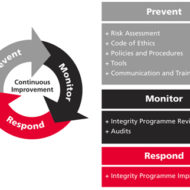Currently Browsing: Business Ethics
Posted by Managementguru in Business Management, CSR, Entrepreneurship, Human Resource, Leadership, Strategy
on Dec 4th, 2014 | 0 comments

What it takes to be a Leader What is #Corporate Social Responsibility? High performance is generally measured against key business imperatives including #competitive advantage, #sales, #talent management, #operational efficiency, #return on investment and profitability. It is no longer adequate for a corporation to revel in economic prosperity in isolation from those agents impacted by its actions. Today, a new element of leadership is making an intense difference in weighing business performance: Corporate Social Responsibility. The late 1990s and the early 2000s saw an uptake in businesses giving proceeds or providing volunteers to causes related to their brands. Some called it “corporate social responsibility”; others called it “corporate #philanthropy” or “#corporate citizenship.” Regardless of its title, it was a way for business to increase visibility while raising funds for good. The spotlight is on both increasing the firm’s bottom line and being a good corporate citizen. Keeping abreast of global trends and remaining committed to financial obligations to deliver both private and public benefits have compelled organizations to restructure their frameworks, rules, and business models. Where does the roots of CSR lie? Although the #roots of CSR lie in altruistic activities (such as donations, charity, relief work, etc.) of corporations, globally, the concept of CSR has evolved and now embraces all allied concepts such as triple bottom line, corporate citizenship, philanthropy, #strategic philanthropy, #shared value, #corporate sustainability and business responsibility. You might be wondering what is “Triple bottom line?” (abbreviated as TBL or 3BL) – The term coined by John Elkington in 1994, incorporates the notion of sustainability into business decisions. The TBL is an #accounting framework with three dimensions: social, environmental (or ecological) and financial. “A plethora of research points to a majority of stakeholders agreeing that CSR is a ‘must do’,” and 67% of consumers say they are more likely to buy products and services from a company if they know it supported good causes. Smart Corporations: As a key component in business #strategy and execution, CSR is playing a crucial role in helping organizations to be seen as leaders. Smart corporations are allocating increasing internal resources to CSR investments that include clear objectives and furnish measurable social outcomes. India is a country of multitude contradictions. On the one hand, it has grown to be one of the major economies in the world, and an increasingly important player in the emerging global order, on the other hand, it is still home to the largest number of people living in absolute poverty (even if the proportion of poor people has decreased) and the largest number of malnourished children. This is the sad state of uneven distribution of the benefits of growth which many believe, is the root cause of social unrest. Companies too have been the target of those disconcerted by this lop-sided development and as a result, their contributions to society are under severe scrutiny. Many companies have been astute to sense this development, and have responded proactively while others have done so only when advocated. What it takes to be a Leader-2...

Posted by Managementguru in Business Ethics, Business Management, Organisational behaviour, Principles of Management, Strategy
on Mar 23rd, 2014 | 0 comments

Tactics or Strategy – Ethical Considerations Give a man a fish everyday, his appetite is sated. Teach him how to fish; you have fulfilled his appetite for an entire life time. This is strategy. To make it work, to make the impossible, possible. There is no drawn out template for success or for that matter strategy. But both of them go together when the right strategy is used at the right time and you can bang on your target. Neither the same strategy fits the bill for everybody. Your smart approach to that particular situation backed up by your knowledge and experience does the magic. It cannot be taught, it comes from within when the situation warrants for action. It is more like “Survival of the fittest”, if you want to retain your niche in this business world you act fast and think wise. Tactics: How many of you are bold enough to think differently to make a difference, to make others feel your presence. Never implement tactics which is short lived and don’t make your presence felt either by imitation or by unethical competitor criticism. That will paint a greasy picture on your firm. That is of course strategy but cheap strategy. But always be on the run to know your competitors’ weaknesses and shortcomings which will make you improve your product or service. That is acceptable business practice where competitor spying gives us an edge in terms of identifying unexploited niches of the market. Resort to Constructive Strategies: Strategies must always be constructive and it assures success in the long run. Tactics or gimmicks will prove to be fruitful only for a short while and that is not your aim also. Will you be satisfied if you are able to sell your product or service as hot cakes only for a season! Is that going to cover your profit margin for the entire accounting year? True, strategies are always associated with making profits, boosting up the sales, for retaining the market share and maximizing the share value. But it should also make your business perennial and viable. Strategic Framework: Many of us forget that strategies are applicable in every activity of a firm that forms a compact framework which gives your business a solid foundation upon which you can build your empire of success without looking back. Right from framing your vision, mission, policies, procedures and programmes including recruitment, selection, training, evaluation and empowering your employees, strategies play their role in giving clarity and direction to the firm. Long-Term Planning: Although strategies are meant for long term planning, a periodic review and appraisal of the company’s strategies to all the employees concerned is a must to keep them informed. Strategies are secrets but not to the employees of your organization. Strategies are born out of compulsion, a compulsion to survive in the market and have an edge over others. So they must be meticulously planned after brain storming sessions and expert consultations. Sometimes even a small idea suggested by one of your employees might become the basis for a turnkey operation. So keep your eyes and ears open and also be open minded to accept ideas even from the lowest level as they are your pillars of strength and they know the pulse of the market and people better. Strategic Action Plans: Success is not a cake walk, it has to be achieved with great hardships and the taste of success will be sweeter. Strategies are formulated in every step of your business plan, remember it is an ongoing process; you have to revitalize your strategies every now and then to be in the scene, to make...

Posted by Managementguru in Business Ethics, Business Management, Principles of Management, Strategy
on Mar 15th, 2014 | 0 comments

Social Value of Corporate Companies Economic Responsibilities: Ethical and discretionary responsibilities of a business firm are listed in the order of priority. First, a firm has to satisfy its economic responsibilities, followed by fulfilling legal responsibilities in order to survive in the market. Only then, it can think about or focus on purely voluntary actions pertaining to ethical consideration. In this competitive market situation, a business unit has to concentrate on profit making, the primary motive behind any business activity. However; it is easier said than done. You cannot hit the bull’s eye at the very first attempt. A firm has to become economically stable first; only then, it integrates social commitments in its agenda. Arguments for social responsibility: Public image: Socially responsible firms gain more customers and employees feel proud to work for such organizations. Handling the government regulations with ease: Government is a massive institution with long arms. It seeks to regulate business in public interest. Before government stretches its long arms, business persons should discharge their obligations to society. Business is resourceful: With a pool of resources, such as capital, labor and expertise, business is in a better position to tackle social problems and work for social goals. Let business try: It is that many other institutions have failed in handling social problems. So why should not a business enterprise handle social problems? Prevention is better than cure: Social problems have to be handled by the management at some point of time or the other. Problems with labor unions should be handled in a diplomatic way, so that they will not develop into serious social breakdown that consumes most of the management’s time. As a token of gratitude: Business units benefit from society. Based on the commonly accepted principle, that one owes debts of gratitude towards those who benefits us, the corporations have debts that it owes to society. Arguments against social responsibility: Profit maximization is the ultimate goal: Business units are accused of having profit maximization as their goal. Since business operates in a world of poverty and hunger, the economic efficiency of business is a matter of priority and should be the sole mission of business. Society has to pay the cost: The costs of social responsibility will be passed on to the society and the question is can the society bear these additional costs? Lack of social skills: Managers are here to solve economic problems and they do not possess knowledge or skills to provide the right solutions for social problems. Business has enough power: Business already is wielded with enough social power. The society should not take any steps, which will make it stronger. Social overhead costs: Costs on social responsibility is considered a social cost, which will not immediately benefit the business. Why spend money on an object, the benefits of which will be relished only in the future. Lack of broad support: The idea of business involvement in achieving social goals is not widely supported by many groups in society. Business and society are interlinked in many ways and the business has to handle the societal aspects with great care or else it may have to face the consequences arising out of such misappropriation or...

Posted by Managementguru in Business Ethics, Business Management, Human Resource, Principles of Management
on Mar 15th, 2014 | 0 comments

What is Social Audit? A formal review of a company’s endeavors in social responsibility. A social audit is a method of assessing, comprehending, reporting on, and eventually improving an organization’s social and ethical performance. A social audit assists in closing gaps between vision/goal and reality, as well as between efficiency and effectiveness. Social Obligations of Business Organizations: Every business organization has certain social obligations to be duly discharged to employees, government, owners, buyers, public, environment etc. It is a good thing that businesspersons of today have understood their obligations and have been discharging them ably. Social audit scans the scope of the social responsibilities of a business enterprise and evaluates an organization’s social performance. Introduction to 3D Modeling Measure of Social Performance There are no specific measures established to rate the social performance standards of a business enterprise. Nevertheless, business enterprises do not seem to understand the relevance of social audit because much importance is attached with the economic aspects of a business. The features of social audit are listed down for better understanding of the process: The focus is on the social aspect of a business organization rather than its economic aspect. The activities of a firm that has an impact on the society, such as, environmental quality, consumerism, opportunities for women and other disadvantaged people in the society are taken into consideration for analytical purpose. How to measure social performance of companies? Social audit is confined to the process rather than concentrating on the results of social action. It is quite difficult to measure social performance in quantitative terms. How do you quantify social philosophy of management and human values? Qualitative measurement is also relative, as, what appears right to one person may not be so for another. So a combination of quantitative and qualitative data must be used for the purpose of this audit. If an internal auditor does the assessment, there is this problem of loyalty, which will outweigh all the other shortcomings present in the business. If an external consultant is made to assess the situation, he can analyze the situation with no bias but he will not be familiar with the business activity of that particular firm. Therefore, a combination of both can work out well to carry out the assessment as they can complement each other. A New but Necessary Concept Social audit is a new concept, so there are not much standard procedures available to follow. Most companies are at the beginning of the learning curve with this process. When companies do begin audit procedures, they tend to find that the process is more complex than originally contemplated. However, every aspect of business and its management has to be explored and analyzed for the benefit of future generations, so as to take proactive measures to tackle problem situations. Business firms obtain their resources from the society and are dependent on the society to sell their produce too. Hence, it becomes their moral responsibility of caring for the society, within their scope and potential....

Posted by Managementguru in Business Ethics, Business Management, CSR, Economics, Organisational behaviour, Principles of Management
on Mar 15th, 2014 | 0 comments

CSR – An Image or Ethos A company’s sense of responsibility towards the community and environment in which it functions is known as corporate social responsibility.The object of social responsibilities of business has become the hot topic for discussion. Let’s not forget that really big companies are into the process of service benefiting economically backward population. It is widely accepted that accountability to owners is too narrow a concept for today’s business and that there is no reason why owner’s interests should take precedence over the interest of other claimants-employees, consumer community and the society at large. Responsibilies of Business Concerns: There is no definition of the concept of social responsibility which is valid for all business concerns and for all times. This is because responsibilities of business should be related to the changing societal expectations, which is dependent upon the social, cultural, political and other environmental forces, which are dynamic too. Business responsibility to the society goes beyond simply assuming the profit-making role. It implies that the management has to protect and improve the welfare of the society as a whole along with its own interest. What is the primary objective of a business? One common misunderstanding about the concept of social responsibility has to be clarified here. It does not challenge the primary objectives of business. It does not say that “to make profit is to sin.”Profiteering is different from profit making. Selfish interest is different from self-interest. Social responsibility is against profiteering and selfish business behavior. But profit making and self interest should be the basic elements of corporate responsibilities. Economic concerns and social concerns need not be viewed as opposite ends. They are complementary to each other. They are consistent with one another. Thus the nature and content of business responsibilities depend upon societal expectations placed on organizations which include invariably the economic performances and legal obligations, and go beyond them. How far it goes beyond depends on the economic, social and political environment in which the business and society operates. Arguments against social responsibility: The arguments against social responsibility are based on the belief that the society assigns a strictly economic role to the organizations and the concept dilutes the primary purpose of the business. Business should mind its business and business persons don’t have the right attitude to serve the society. Let it be the responsibility of government and social service organizations. Business has already enough economic and social power and no more concentration of power is necessary to business circles. Service to society is undoubtedly an important objective of business. It can render service to society by providing quality goods and services to the community; it can provide adequate opportunities to the members of the society; provide goods and services at reasonable price. Another important aspect would be to ensure control of pollution towards air, water and soil. Showing concern for the well -being of other constituencies of the society is a good gesture that helps the business to earn goodwill and support of the society as a...










